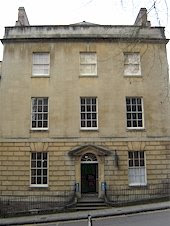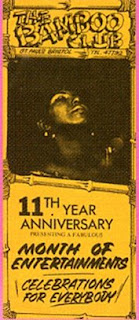skip to main |
skip to sidebar
 Mandy McIntosh is a Glasgow based artist who uses an array of media: animation, video and knitting in the development of her projects. Employing a variety of methods McIntosh’s work often responds to particular social, historical and geographical contexts. 'My work is very mobile, sometimes electronic, sometimes film, sometime objects. When I say mobile, I mean that it shifts context and form and methodology. Sometimes it’s made in a site-specific sociological context, for example, a virtual reality simulacrum of a real mining village in Staffordshire which hosted a hypothetical monument to miners. Sometimes it’s more simple. Recently, I made a garment which encapsulated my thinking on the symbolism of vultures in the American landscape. For Bamboo Club, Mandy would like to develop a project out of an extended visit to Bristol and time spent at the Georgian House site.
Mandy McIntosh is a Glasgow based artist who uses an array of media: animation, video and knitting in the development of her projects. Employing a variety of methods McIntosh’s work often responds to particular social, historical and geographical contexts. 'My work is very mobile, sometimes electronic, sometimes film, sometime objects. When I say mobile, I mean that it shifts context and form and methodology. Sometimes it’s made in a site-specific sociological context, for example, a virtual reality simulacrum of a real mining village in Staffordshire which hosted a hypothetical monument to miners. Sometimes it’s more simple. Recently, I made a garment which encapsulated my thinking on the symbolism of vultures in the American landscape. For Bamboo Club, Mandy would like to develop a project out of an extended visit to Bristol and time spent at the Georgian House site.

Mark Wilsher is an artist, curator and writer currently based in Norwich. His practice incorporates, sculpture, drawing and performance. For EAST 05 exhibition in Norwich, Wilsher performed a different speeches every Saturday for 7 weeks, his re-enactments often confront audiences with a replaying of little read and seldom heard historical documents.a video of Mark Wilsher's performance at the opening - wherein this white, preppy-looking artist recited Martin Luther King's 1963 'I Have a Dream' speech. Presenting himself as a 'semi-subjective filter of news and witness to history', Wilsher managed with very simple means to create a heady complex of mixed emotions that alluded strongly to the present moment, and which had a leftfield bravery about it characteristic of the best of the show."Martin Herbert, Modern Painters Nov '05He has recently been making works that re-engage with abstract public sculptures dating from the late 1940s to the 1980s. Such works – often large composites made of metal, and many by artists that have been forgotten today – continue to have a life in the form of photographs in old journals and catalogues. Wilsher used his fellowship at the Henry Moore Institute in Leeds to study these works, and the resulting body of work will be on show at the Institute in 2008. For Down at the Bamboo, Mark is interested in exploring the rich history of sermons and speeches at The Wesley Rooms, with its social function within Bristol and historical links to the abolitionist movement. Mark in conjunction with a group of participants might research, develop and stage a series of re-enactments.


Barby Asante is a London-based artist who uses engagement and participatory strategies to explore her interest in performativity, particularly in relation to her cultural identity. Many of her ideas consider that we are all complicit in the creation and construction of our identities and the identities of those around us. She is interested in how we perform our identities and wants to create works that do not assign the problem of identity to particular groups in society, but rather consider identity as something that effects us all. She has exhibited widely in the UK and abroad. Projects include I Accept Your, Image I am You, 198 Gallery, Journey Into The East, The Showroom Gallery and Futurology: Black Country 2024, New Art Gallery, Walsall. She was Lead Artist for the Bow Festival Roman Road Revel (2004) and is currently working on You Should See Kaba Styles for Africa Remix, at the Hayward Gallery in London. ). In 2006 she began collaborating with Andrea Encinas on the Funk Chorus, which invites people to share their desire to sing. She is currently working on a project with older people exploring karaoke and the possibility of this popular activity as being an outlet for our personal histories and memories. Barby also has extensive experience in running workshops and she talks regularly to artists about practice. Barby is very interested in the Bamboo Clubs’ Social and cultural legacy and is very keen to develop the project through meeting individuals like founder Tony Bullimore and musicians and regular club members. She’s also interested in re-engaging young and contemporary audiences in Bristol with this rich social and oral history.
Hello
I am Harold Offeh and with Picture This, I am co-curating "Down at the Bamboo Club". The project consists of programme of activity exploring aspects of Bristol's social and political histories using devices such as irony, oration and filmic re-creation. The project will use re-enactments to enable participants to explore subjects such as community relations, the legacy of slave trading on the city's economy and communities, histories of division and solidarity, and the heritage of their own roles in the city today.
My involvement stems from an invitation from Picture This Director Joesphine Lanyon to help develop and curate a series of projects that negotiated aspects of Bristol's history, particularly in relation to the Abolition 200 commemorations taking place in Bristol and cities like London and Liverpool. Picture This and I identified a number of project partners that would form a base for the invited artists research and production.
Up until June 2009 the invited artists Barby Asante, Mark Wilsher and Mandy McIntosh will developed separate projects engaging participants in the history and legacy of 3 sites. This blog will attempt to map out and document some the artists research and the development of the project leading up to group exhibition to be staged in bristol in the Summer 2009. I hope the blog with also act as a forum for comment, discussion and debate. I'll be making regular contributions to contextualize the project and hopefully the page will archive the overall projects development
Barby Asante, Mark Wilsher and Mandy McIntosh are working with:
Bristol’s Georgian House is an 18th century townhouse built for John Pinney, a West India merchant who retired to Bristol from the plantations. Due to conservation issues, it is difficult for the institution to increase its but the curator is keen for artists to explore the meanings present within the building and create greater understandings around its history.
The New Room – John Wesley's Chapel, is the oldest Methodist Chapel in the world with a unique history in relation to the bicentenary of the parliamentary Abolition, it was here Wesley wrote his paper Thoughts Upon Slavery in 1774. The Chapel is keen for its history to be re-interpreted and made relevant to contemporary debates around human trafficking.
The Bamboo Club – a legendary venue in St Pauls – encouraged social interaction between communities through music and dance at a time when there was still a colour bar preventing employment of black people drivers or conductors on Bristol buses. The venue held powerful resonance for many Bristolians now aged 55 and over, and its heritage exists largely through reminiscences, the ongoing friendships it fostered and the positive affirmation of community relations it represented. The Bamboo Club burnt down in 1977.




